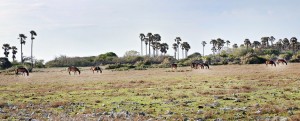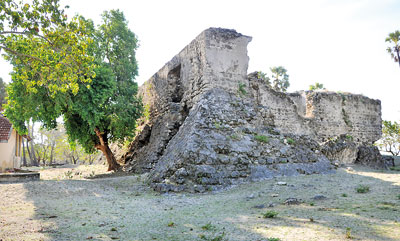News
Billion-rupee eco-tourism hotel project in Delft Island falls apart
A billion-rupee project to erect an eco-tourism hotel on remote Delft Island in the North has been vetoed by the Prime Minister’s office even after developers spent four years finishing paperwork.

Delft Island: Where wild ponies and donkeys roam. Pix by Lakshman Gunatillake
Proposed by a local company called Palk Bay Resorts Ltd, the venture was backed by the Northern Provincial Council and the Board of Investment. But the Prime Minister recently decided it should be shifted elsewhere, BOI sources said this week. Therefore, the developers — who had taken four years to complete tedious approvals — have now been told to find a different location for the project.
“We spent several years travelling up and down, dealing with government departments, ministries, meeting the Chief Minister and BOI officials,” said Bernard Goonetilkeke, a Director of Palk Bay Resorts along with Kandasamypillai Balasundaram and Rajan Asirwatham. “Considerable human effort was expended.”
The project was pushed by the previous regime through the Ministry of Investment Promotion. However, it became victim to a Government and policy change, illustrating the risks companies face in considering Sri Lanka as a venue to park their monies. The developer’s experience also provides insight into the multitudinous steps that must be followed to jumpstart a private venture, particularly if State-owned land is involved.
Palk Bay Resorts was floated as a special purpose BOI-approved company by Mercantile Merchant Bank Ltd (MMBL) in 2012. MMBL had earlier teamed up with Jetwing Hotels to set up the three-star Jetwing Jaffna which opened this year and the intention was to replicate the success of that project. It was initially proposed to spend Rs. 600 million on the hotel but the figure was revised to Rs. 1 billion.
“We did not have a foreign investor, to begin with,” Mr Goonetilleke explained. “Our modus operandi is to get the necessary approvals, then go for investors and put up the project. This was how we did Jaffna Jetwing.” The major investors for Jaffna Jetwing were local but it also had the backing of a party from Norway.
Negotiations to set up the ecotourism hotel in Delft, or Neduntheevu, started in 2012. The priority was to secure via lease a 40-acre plot of State-owned land on the island. A suitable property was identified in 2014 in conjunction with the then Northern Province Governor G. A. Chandrasiri, and Northern MP Douglas Devananda, a strongman in Delft.

Ruins of the Dutch Fort on the island
The developer approached the Department of Land Administration in the North and also met Northern Province Chief Minister C.V. Wigneswaran. “He secured the consent of the Northern Provincial Council within two weeks and a recommendation was sent to the Land Commissioner General’s Department in Colombo,” Mr Goonetilleke recounted.
The Land Commissioner then wanted Sri Lanka Tourism Development Authority approval in order to lease out the land. But the SLTDA wanted title deeds to the land or the lease agreement. “Without it, we couldn’t submit an application to the SLTDA and, without an application, the SLTDA could not say ‘yes’ to the project,” Mr. Goonetilleke said. “Meanwhile, the Land Commissioner wanted SLTDA approval. He asked how else he could guarantee that we would implement the project after securing the land.” After much to-and-fro, the problem was solved when the SLTDA and Urban Development Authority issued no-objection letters.
A Cabinet paper was then presented by the Ministry of Investment Promotion. This led to the Ministry of Finance advising that the project be referred to the Standing Cabinet Appointed Review Committee (SCARC), which was the procedure followed for unsolicited proposals. More form-filling followed before the papers were sent in to the SCARC.
In the meantime, however, the Government changed and the SCARC was disbanded. And the developer, one year and two months later, received a letter from the BOI hailing the project as a good one but stating that a different location will have to be found for it in consultation with the Northern Provincial Council.
“Our point was that this was a neglected island,” Mr Goonetilleke said. “While the population in other parts of the Peninsula had risen, it had gone down in Delft. The young people had no jobs. The only employment was generated by a small, Navy-run garment unit.”
The developer had planned to build on Delft’s colonial heritage and to also introduce a breeding programme for the island’s famed wild ponies after learning that many of them perished without water or fodder during dry season. Construction of the hotel was to have been done using local materials so as not to be obtrusive to the natural surroundings of the island.
Environmentalists interviewed by the Sunday Times said that a well-conceptualised eco-tourism project implemented on the basis of a professionally conducted Environmental Impact Assessment (EIA) would serve an underdeveloped island like Delft well. However, the Palk Bay Resort venture did not go that far.
“To do anything, we must have the land with clear parameters; a document in your hand in the form of a title deed or lease,” explained Mr. Goonetilleke. “We cannot do EIAs for Government land. Trying to do things with Government land in Sri Lanka is like hitting one’s head against a rock.”
“Only a project of this kind can be effectively used in a place like Delft,” a senior Government official said, on condition of anonymity. “No other agricultural or industrial project is feasible on that island. If there is someone willing to invest that amount of money, it is plain silly not to use it after a proper EIA and so forth.”
“It was also a comprehensive proposal that included the building of a small reservoir and a breeding ground for the world famous wild ponies,” he continued. “It would have used the local attractions like the unique Delft corals. It would have been ideal for tourists who prefer seclusion. Infrastructure would have come up with a new jetty and ferry service. One cannot understand why, when an investor is willing to invest in all that, we are not encouraging that investment.”

